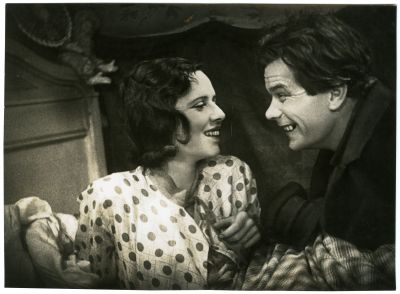
RAZZIA IN ST. PAULI
(Razzia a Saint Pauli, Germania/1932) R.: Werner Hochbaum. D.: 62'. V. tedesca
T. it.: Razzia. T. int.: Raid in St. Pauli. Scen: Werner Hochbaum. F.: Adolf Otto Weitzenberg. M.: Carl Behr. Scgf.: Willy Schiller. Mus.: Kurt Levaal. Int.: Gina Falkenberg (Else), Friedrich Gnaß (Karl), Wolfgang Zilzer (Leo), Charly Wittong (Charly), Max Zilzer (l'oste), Ernst Busch (cantante). Prod.: Orbis-Film GmbH, Berlin. 35mm. L.: 1712 m. D.: 62'. Bn. version.e tedesca / German version. Da: Deutsche Kinemathek per concessione di Marion Rosenfeld Behr
Il cinema come laboratorio della fisicità. L'intensificazione impressionista è la formula su cui si basa Hochbaum, il quale ancora una volta vaga per la città di Amburgo, fissando lo sguardo sulla superficie delle cose che si animano sotto l'occhio della macchina da presa. I dettagli raccontano storie, le piccole cose diventano eloquenti. "Il cinema è vero; una storia è una menzogna", scrive il regista e teorico francese Jean Epstein nel 1921. È una massima poetica che vale anche per Hochbaum nei primi anni Trenta. Nello stesso tempo, il regista tedesco insiste sul fatto che il cinema deve cogliere la realtà ed esprimere, se non condurre, la lotta di classe.
Nel porto di Amburgo è una giornata come le altre. Le grandi navi riversano sulle banchine una folla di portuali. Alla fine della giornata le gambe dei lavoratori arrancano stanche verso casa. In città però il loro movimento si fa più rapido. La metropoli esige velocità. Il passo accelera, le prospettive si intersecano, un caleidoscopio di insegne al neon propone le sue lusinghe. La stanchezza si trasforma in danza e l'industria del piacere notturno si mette in moto. C'è chi cerca un cliente e chi vuole divertirsi. E tutti si lamentano della situazione economica. Else, disincantata passeggiatrice della Repubblica di Weimar, ha una sola debolezza: va pazza per le storie d'amore dei film sdolcinati. Lo spaccone Karl ha rubato un paio di orologi ed è in fuga dalla polizia. Si ritrova nella soffitta in cui vive Else, che lo nasconde. Lui le fa le moine, le mette in testa un mucchio di sciocchezze e le promette una vita insieme lontano da St. Pauli. Lei accetta. Non le resta che dire addio a Leo, il triste musicista con cui vive. La scena si sposta nella squallida osteria del porto dove Else e Leo lavorano notte dopo notte. Qui il tempo vacilla, gli intrecci si dipanano, i sogni cambiano. La percezione si altera mentre la polizia si mantiene lucida. Hochbaum dispiega una stanca utopia che non riesce ad arginare lo scorrere inarrestabile del tempo. Rispunta l'alba sulla città grigia "dove dal cielo scende la polvere e non la rugiada".
Elisabeth Büttner
The cinema as a laboratory for the physical. Impressionist intensification is Hochbaum's modus operandi. Again, he is roaming Hamburg, fixing his gaze on the skin of things brought to life by the camera. Details tell stories, little things become eloquent. "The cinema is true, a story is a lie", writes French Film enthusiast Jean Epstein in 1921, a poetic maxim which for Hochbaum also holds true in the early 1930s. At the same time, he insists that the cinema must capture reality and give expression to, if not negotiate, class conflict.
A day like any other in the port of Hamburg. Dock workers spill out of big ships. Back on shore after a good day's labor, legs are walking inland with an adequately heavy gait. In the streets, their movement gains momentum. The big city requires speed. The pace quickens, perspectives intermingle, a kaleidoscope of neon signs allures. Exhaustion turns into dance, and the nightlife industry awakens. Some are out for customers, others for amusement. And everybody complains about how bad the times are, economically. Ballroom-Else, a disenchanted streetwalker in the Weimar Republic, has one weakness: she falls for the mawkish stories of the movies. The swashbuckling Sailor-Karl has snatched a couple of watches and is on the run. He somehow ends up in the attic where Else lives. She hides him from the police. He cajoles her, putting silly ideas in her head and promising her a life together far away from St. Pauli. Finally, she agrees. So all that's left to do is say farewell to Leo, a demoralized musician beaten by life with whom Else shares her attic. Their way leads them to a sinister quayside bar where she and Leo both work night after night. Here, time falters, plots unravel, dreams change. Perception becomes blurry while police keep clear heads. Hochbaum unfolds a tired utopia that cannot stem the tide of time. A new morning breaks over the gray city "where dust, not dew, falls from the sky".
Elisabeth Büttner
Tariffe:

Numero posti: 144
Aria condizionata
Accesso e servizi per disabili
Il nostro cinema aderisce al circuito CinemAmico: è possibile utilizzare l’applicazione MovieReading® per i film di cui è prevista audiodescrizione e/o sottotitolazione sull'applicazione.
Tel. 0512195311











